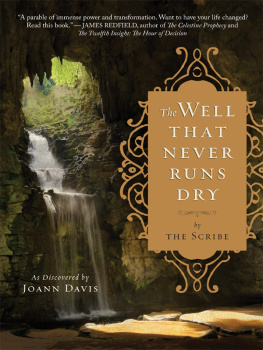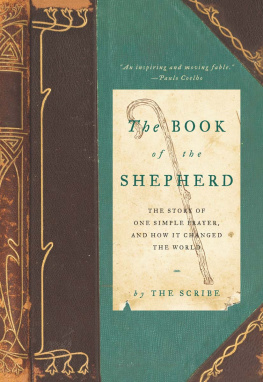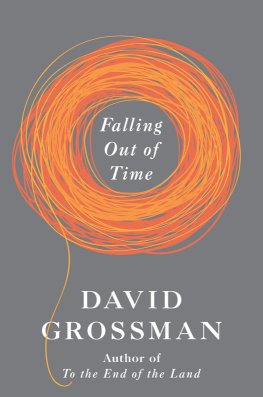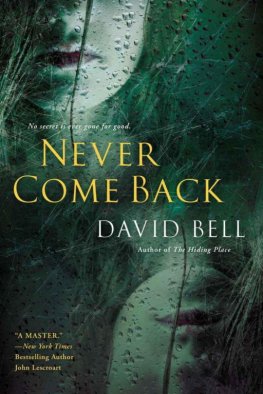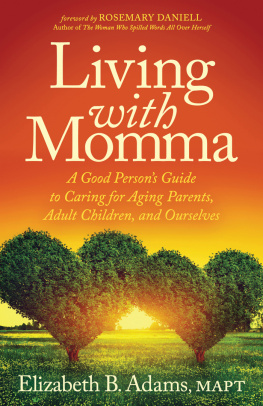To the recklessly generous and
the relentlessly kind
To my mother,
Anna Loretta Margaret
LAST DECEMBER, WHEN I WENT TO THE POST OFFICE TO COLLECT my mail, there was a curious package waiting for me at the clerks desk. Wrapped in crisp brown stationers paper and lined with rows of exotic stamps, it bore the distinctive label of an antiquarian bookshop in Frankfurt, Germany, called Antiquariat Reinhold Streu.
To be honest, I felt like a small child at Christmas as I tore open the package, not knowing who had sent it or what was inside. The mystery deepened when a card tumbled out that was inscribed, And will you do it again?
Intrigued, I headed home to inspect my Secret Santa gift. It did not take a bibliophile to know that there was something quite special about the book it contained. Bound in vellum, it was impressed with the image of a woman holding a chalice in her outstretched hands as she stood on top of a rock. On the ground, by the womans side, lay an unsheathed sword.
Drinking in the symbols, I felt like a thirsty traveler at a deep, rich well. But something else caught my eye. The size, look, and feel of this book were strikingly similar to The Book of the Shepherd. How did the mysterious sender know of my role in helping to get that earlier book translated and published? Were the two books related? I could only guess.
But it was not time for hypotheticals.
Opening the book, I perused the interior, hoping to find some exceptional marking or clue of origin. One thing was evident: like The Book of the Shepherd , this volume was written in an obscure languagea strange hybrid of Greek and Aramaic that I would later learn had not been spoken since the first century, or written since the late Renaissance. A team of linguists would be needed to decode itperhaps the same group I had assembled for the Shepherd project.
And would I do it again?
Astute readers will ask: Is the manuscript that follows authentic? Should we put our faith in it? These are legitimate questions I plan to address in a separate publication. For now, let me state that I think truth, like beauty, is in the eye of the beholder. And let readers judge for themselves.
J OANN D AVIS
Dorset, Vermont, February 2010
S HE DID NOT HEAR. SHE COULD NOT HEAR. She did not know. She could not know. She did not help. She could not help. Yet she suffered gravely for all that she did not do to save the childs life.
It had happened on the morning of a day like all others. Rising at dawn, she had packed her basket for a trip to the river to wash her garments in the cool stream. She would go quickly, work steadily, and be back before her family awokethat was her plan.
But on this morning, as she tiptoed past the bed where her little girl lay sleeping, the child woke up.
Look, Mama! Do you see me, Mama? the girl called out, waving her hands in the air. Ill be your helper today.
Like a streak of lightning in a placid sky, the girl jumped up and got dressed, slipping a crisp white tunic over her head and sliding her feet into a tiny pair of sandals. She was four years old and proud of the help she gave her mother around the house, setting the table and filling the water pitcher. That she would soon be old enough to wear a sash and sit with the older girls at temple brought a smile to the girls face, which was framed by an angelic halo of golden curls.
Look, Mama! she said as they began the short walk to the river. I can shake like the belly dancer at the wedding feast. The tiny girl wiggled her reed-thin body and drummed her hand on an imaginary tambourine, hoping to brighten her mothers face.
But the woman was somber. She loved the girl with her whole heart and enjoyed tutoring her in the ways of women. But the possibility of lingering too long at the river and returning home too late to prepare breakfast for her ill-tempered husband struck fear in the womans heart. She did not want to anger the man.
Motioning the girl to a sand pile near her washing place, the woman settled the child down to play. Then the woman began dipping her garments in the river, which was rough and rushing after a torrential rain. Each time the woman rinsed a sash or a tunic, she glanced over her shoulder and waved, making sure that the child was still busy with her make-believe games. All seemed well.
But the girl had tricks up her sleeve.
Look, Mama! the girl called out as she suddenly bolted up and ran toward the water. I can jump like the temple dancers.
But as she skipped and gamboled toward the stream, she slipped on a mossy stone and slid down an embankment into the rushing water of the rain-swollen river. Sucked into a whirlpool, she was spun in vicious circles and then throttled like a rag doll.
Mama! she frantically called out as the swift current began to carry her downstream. Mama! she cried as she tried to stay afloat. But her mother was deaf and did not hear. And she did not know. And she did not come to help the child.
And later, when the girls tiny body was found, the woman suffered gravely for all that she did not do to save the childs life.
W HY DO THE RIGHTEOUS SUFFER?
Why does God take children before their time?
Why is the universe so cold, cruel, and unfair?
For centuries the people had asked these questions and for centuries the answers had come back the same from the elders and the prophets. The people suffer because the people sin. Suffering is punishment for the wrongs that are committed.
But was this true? Did a man reapeth as he soweth? Were evildoers bruised for their transgressions while the kind and the good were rewarded?
Elizabeth wondered. As she lay outstretched in an open field, beneath a blanket of twinkling stars, she thought about the day. It had begun at dawn on the outskirts of the village where she had gone to help deliver a baby. By all accounts the expectant mother was a good soul, a kind soul, who gave bread to every beggar at her table, and water to every supplicant at her well.
But as her labor progressed, the woman started to bleed profusely. Elizabeth did all that she could to stop the hemorrhaging, but the woman died, leaving behind a broken-hearted family whose loved one had been taken from them before her time.
Did the woman deserve to die? Where was divine justice when she needed it? Why had her acts of kindness not weighed in her favor on the scales of mercy? Why was a good life cut short?
Later the same day, Elizabeth had been asked to visit a child who had gotten the pestilence. The child was only one year old and not much bigger than a baby lamb. He had just begun to stand on his own two feet and toddle around, calling for his ma-ma and pa-pa. So bright was his smile that hard hearts melted when they saw it.
But when the boy fell ill, his pain was so excruciating that it baffled the most learned apothecaries. The boys pleading eyes begged for relief. But his mother was helpless. When he died, Elizabeth placed small white stones on his eyelids to seal them for eternity.
Then at eventide, Elizabeth had been at the river, collecting herbs and spices for a meal she was preparing for her husband, Joshua, the shepherd. He was going to the High Ground to help resettle the villagers who had lost their dwellings in the flood. Elizabeth and her adopted brother, David, wanted to make a good meal for Joshua before he departed on his long, arduous walk with his sheep. Both were looking forward to spending time with the shepherd at the end of a long day.
But Elizabeths plan took a sudden detour when she went to gather lilies along the edge of the river. She was in the brambles when she saw something out of the corner of her eye. What was this? Had someone left a garment behind? Perhaps a washerwoman or a slave had misplaced a scarf or sash belonging to a royal lady. If so, someone was in for a scolding. There would be hell to pay.

